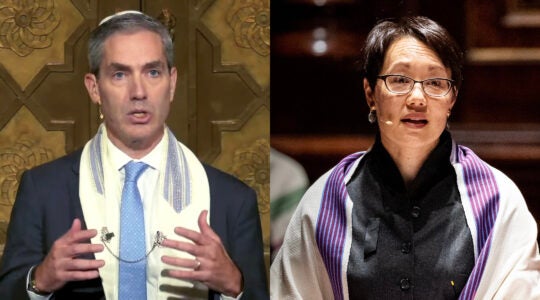The following is an edited and condensed transcript of a March 26, 2008 telephone interview with Rob Eshman, editor-in-chief of The Jewish Journal of Greater Los Angeles, and U.S. Sen. John McCain, presumptive Republican candidate for president.
John McCain: Hello Rob, how are you?
Rob Eshman: Hi Senator, I appreciate your time thank you.
JM: It’s a pleasure.
RE: I was at your speech this morning at the World Affairs Council.. and I wanted to continue to explore those issues, but from the perspective of American Jewish voters.
So I guess we’ll start with Israel. You know all three of the candidates espouse faithful support of Israel, and there seems to be a longstanding bilateral U.S. consensus on Israel regarding the conflict of the Palestinians. I wonder how you think your support for Israel differs from that of Hillary Clinton or Barack Obama?
JM: Well I don’t know what their support is so it’s hard for me to compare it. I would just say that my first trip there was back in the late 70s with Scoop Jackson. (laughs). And I will never forget at the airport there was a crowd of people that were there to show their appreciation for Scoop, and he stopped some in the crowd and told us to stop so that he could greet Nathan Saransky’s wife, and I will never forget that one as long as I live. So again it’s like on other national security issues, it’s a matter of knowledge, background, experience and judgment. That’s all.
RE: Senator Obama’s advisor General Merrill McPeak has been criticized pretty harshly for statements he made of the effect that American Jews wield too much influence over America’s Middle East policy. But his comments echo very similar ones made in the past by one of your advisors, [former Secretary of State] James Baker. Is criticism of those statements legitimate, or is it kind of a partisan game that we’re watching?
JM: Former Sec. Baker is not quote an advisor of mine. He runs an institute at Rice University, and I certainly admire and respect Sec. Baker, and I have to say that because he was Chief of Staff to President Reagan and he was Sec. of State, he has a long and illustrious career, but that does not mean that Secretary Baker and I are in agreement on every issue. I think he plays a far different role in my campaign than General McPeak does, and it was only recently that former Sec. Baker endorsed me. It was just before some the later primaries. But look, I in no way distance myself from Sec. Baker, and my respect for what he’s done for the country. We just may not agree on every issue that affects the state of Israel or other issues.
RE: As you know there’s strong support for Israel in the evangelical Christian community, and that community is also strongly opposed to aspects of Palestinian –Israeli peace negotiations, such as territorial compromise and the division of Jerusalem. Because the evangelicals are a significant source of your support or you’d like them to be, how do you convince them then to go along with the painful compromises Israel will need to make whether at Annapolis or under your administration? What would you say to them to get them to go along?
JM: Well I’m not asking them to go along with anything. I’m expressing my appreciation for their support of the State of Israel, for the absolute criticality of its survival. You can’t jump ahead here. I know they favor a peace process. I know they favor that because of my close relations with them and Pastor John Hagee, who’s been heavily criticized as you know for other things, [but] is one of the leaders of the pro-Israel-evangelical movement in America. Look, I just have to tell you that we should be so grateful for the support of the evangelical movement for the state of Israel given the influence that they have, beneficial influence that they have over millions of Americans, and then we’ll worry about a peace process later on, but I know that they are committed to peace between Palestinians and Israelis as well.
RE: …As a military person, someone with deep background and knowledge as you said, no one has clear answers on what to do with the Hamas rockets landing on Sderot and Askelon, but if [Israeli Defense Minister] Ehud Barak were to ask you for some advice, what would you say Israel should do?
JM: Well I wouldn’t presume to give him advice because he’s a good friend of mine for many years, and he’s very very very smart on military issues. In fact we all know he’s a national hero. But I said in Sherdrot [Sderot]—I always mangle the pronunciation of the town – when I was there I stated unequivocally that every nation has the right to defend itself against attack, and the fact is that the children have a 15 second warning of some 900 rockets that have landed in the last less than 3 months, so I think its clear that every right has the….every nation has the right to defend itself against attack.
RE: You said at the speech of the World Affairs Council that you would be personally and deeply involved in the peace process. President Bush waited until the end of his administration to get involved. Do you see yourself getting involved earlier than that?
JM: Immediately. Immediately. And as I said I don’t know how many trips I’ve made to Israel. I know all of the leadership well. I know the parameters that they’re operating under, and I feel fully qualified to hit the ground running.
RE: Has our commitment in money and manpower in Iraq limited our ability to act militarily in Iran?
JM: I don’t think so. I think the United States of America has the capability to defend its national security interests.
RE: So if there needs to be a military solution to Iran’s nuclear programs, do you think the amount of money and manpower that we’ve spent in Iraq won’t hinder us?
JM: I think that the United States of America militarily is fully capable of defending itself and against all threats, against all national security threats. So, because when you say “can it defend itself,” it depends on you know the scenario of what quote defending itself means and so that is a [UNCLEAR] discussion.
RE: In terms of dealing with Iran on the nuclear issue, is there any chance that you would negotiate with them, or is that not an option right now?
JM: Well when you say negotiate with them, our ambassador in Iraq, I believe, has been there three times. There’s been Iranians there in Baghdad. They’ve had conversations. There’s plenty of ways to communicate…many ways to communicate if a country wants to reach an agreement, but no I don’t like to enhance the prestige of someone who announces his nation’s dedication and policy to the extinction of the State of Israel.
RE: On Iraq, you said you were optimistic that the surge is working in terms of bringing military security to our forces and to the Iraqis, but you acknowledge that the political stability is less promising. Now we’re seeing today what’s happening in Basra with the potential that Muqtada al Sadr could lash out again. Is there a point when you would say, look, either run your country responsibly or become another Lebanon, it’s your country, and we’ve done our best. Do you think at some point we would have to say that?
JM: Well let me just say that I’m very satis – I believe that there has been political progress. I want it to be more rapid. I’d like to see political progress in the United States of American. We might even consider doing a budget or maybe sitting down together and fixing social security and Medicare–and I’m a bit sarcastic. But the point is that they are making some progress. Looks like now we will have provincial elections. They did pass a law on addressing the amnesty issue for Sunis. There is de facto revenue sharing from the oil revenues. Democracy is tough, so I am gratified by the progress that’s been made militarily and I see as all counterinsurgencies do, progress on the social, economic and political front and I believe that worst thing we can do is set a date for withdrawal and that’ll be chaos, genocide, and by the way I also feel that it’ll place the state of Israel in much greater danger because it will enhance the prestige and power of Iran in the region.
RE: Do you think the war’s strengthened Iran’s hand in the region?
JM: I think that our failures for nearly four years obviously did it. But I believe that that is being reversed as the surge succeeds, and I think that the Iranians are very possibly going to step up their assistance to the Jihadists because they don’t want us to succeed in Iraq. But Osama Bin Laden has stated that Iraq is the central front. Osama Bin Laden has stated that they have to help their quote Palestinian brothers…now, we know what that means. But Osama Bin Laden has said that the central front in the battleground is Iraq and their Palestinian brothers are next. So what are the implications to the State of Israel if they prevail on Iraq? I think they’re very obvious.
RE: So the Iraq Study Committee, the Baker-Hamilton Commission…recommended that the US deal directly with Iran and other nations around Iraq such as Syria, and try to stabilize Iraq through this external diplomatic effort. Is that something you would take a look at?
JM: I didn’t agree with that any more than I agreed with the call by Baker-Hamilton Commission to withdraw from Iraq, so you know I have great respect for them and appreciation, but I expressed my disagreement at the time.…Look, Iran is a state sponsor of terror. They are sponsoring Hezbollah, right in Lebanon. They are trying to develop a nuclear weapon. They’re committed to the extinction of the State of Israel. They are exporting the most lethal explosion devices into Iraq that’s killing young Americans. Let’s have no doubt about the threat that this nation poses, not only the America’s national security interests, but that of Israel and the entire middle east. If they develop a nuclear weapon, every expert that I know says that there will be proliferation of nuclear weapons in the region.
RE: But do have more leverage when you have contact?
JM: These are not discon–-(inaudible). Tell me the kind of leverage we have with North Korea?
RE: We sanctioned talk with them, right?
JM: We’ve had talks with them. Tell me how much they’ve succeeded. But North Korea is not advocating the extinction of any of its neighbors. Iran is.
RE: I want to switch because I only have you for a little bit, so I want to switch to energy. Every president since President Nixon has promised to reduce our dependence on foreign oil. Why do you think you’ll succeed?
JM: Because I believe I can inspire the American people and I think that when the price of oil went over $100/barrel that there was certainly a psychological barrier there. I think Americans are ready to serve/conserve(?)
RE: As long as the war’s going on, one of the criticisms that has been leveled at President Bush is that he hasn’t asked the Americans here to sacrifice …in conjunction with the Americans who fight over there. Would you ask something of Americans here to bring the war home in some sense?
JM: I’ve asked…will ask many times for Americans to serve a cause greater than their self interests…that’s always been what I’ve (inaudible).
RE: And anything in specific as far as the war?
JM: Sure, there’s a hundred ways to serve one’s country and to serve one causes greater than their self interest and I’m convinced they will do so.
RE: You spoke out today very eloquently about torture of suspected terrorists and I was wondering if you think it was right or wrong to torture somebody like Khalid Sheik Muhammed, the architect of the 9/11 attacks?
JM: Of course not.
RE: Even him.
JM: Of course not. No, not even him (laughs).
RE: You know we all watch too much “24.” Maybe that’s the problem.
JM: I think we do…I think, look, Lindsay Graham and I met with a high ranking member of Al Qaeda last Thanksgiving… I asked them how [they recruited members] after the initial invasion [of Iraq]. He said first the lawlessness and (inaudible) gave him a great opportunity. Second he said his greatest recruiting tool was Abu Ghraib. That should be enough evidence for anybody. … Every single military leader that I know and respect says we shouldn’t torture people.
RE: I have a friend. She’s a Jew, she’s a Democrat. She said that [she] would vote for John McCain …because she loves your positions on so many things especially Israel and the Middle East, but she’s worried that you’ll nominate Supreme Court Justices who will overturn Roe v Wade. I find that sentiment echoed among a lot of the Jews who I speak with. I wonder how you would respond to that concern.
JM: I maintain that I will nominate Judges to the Supreme Court that strictly interpret the Constitution of the United States and I think there’s been too much legislating on the bench. I have no litmus issues nor is it proper to do so, but I will nominate Judges who will strictly interpret the Constitution of the United States. And if that’s her most important issue that I nominate those people who strictly interpret the constitution of the United States, then I respect her priorities.
RE: You know American Jews voted overwhelmingly against George Bush in 2004, and now the common, popular democratic argument against you is that voting for John McCain is giving George Bush a third term. How do you respond to that?
JM: The American people know me and know me well and that’s not reflected in the polls and so I think that they will select a leader that they want based on his or her vision and plans for the future not the past. Gotta go.
RE: Thank you senator.
JTA has documented Jewish history in real-time for over a century. Keep our journalism strong by joining us in supporting independent, award-winning reporting.





